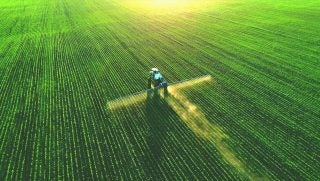Amy Loschen knew from a young age that she wanted to be a teacher. She toyed with the idea of biology since she loved that class in high school. Then it was a great Spanish teacher that made her think maybe she should teach español. But Loschen soon realized her true passion is, and has always been, in agriculture.
“I quickly realized why not combine my passion of agriculture with my desire to be a teacher,” Loschen said. “It also didn’t hurt that I saw the influence my mom had on her students and how so many students thrived in her agriculture classes, so she ultimately was my inspiration.”
This fall the fourth-generation teacher will follow in her mother’s footsteps teaching vocational agriculture and serving as the FFA advisor at Tri-Valley High School in Downs, Illinois. It’s a position Loschen’s mother, Diana, held for 29 years and her father, Gary, held for 12 years prior to that.
While both of Loschen’s parents were active in the classroom, the family was never far from the farm. The Loschen kids were actively involved in raising swine and beef cattle, and the family also farmed on the side.
The Loschens could also probably coin the phrase … the family that does FFA together, stays together … and wins big. Loschen’s favorite memory from her high school FFA was when she and her brother, Tyler, both won National awards.

“It’s not very often that a chapter receives that kind of recognition at the national level, let alone the winners being siblings,” Loschen said. “I know that was a very rewarding day for my mom having her students and own children achieving their dreams.”
Sitting in her mom’s classroom, Loschen also picked up a few teaching techniques along the way.
Loschen said her mom always tried different activities to help students learn content better, and adapted to what students needed and what worked best for them.
“I always heard her say to former student teachers that if they do what’s best for the students everything else will be just fine. The students and their success should be our number one concern,” Loschen said. “I would say that the philosophy of always doing what’s best for the students is the biggest thing I will take with me to Tri-Valley, along with some curriculum and FFA ideas from her of course too.”
When Loschen thinks back to her time in high school she said there’s one key theme she would like to pass on to her students and it’s that you can do anything you set your mind to with enough hard work and dedication.

“Success doesn’t come easy; you have to work for it. But, if you choose to put in the time and effort you can and will be successful in some way,” Loschen said.
Time, effort, and confidence is what helped Loschen gain her ag education degree and it’s her words of advice for others pursuing one:
You won’t be great the first time around.
“In college, they have you teach a couple day lesson to a class either at an observation site or student teaching site,” Loschen said. “My mini lesson the fall before I student taught (I thought) went so horribly that there was no way I would survive student teaching. If you reflect and learn from your mistakes and take advice from others you will steadily improve.”
Get involved in the school – Take time to attend activities or CDE’s with your cooperating school.
“Students see you as a real person and not just a teacher when you take time to attend those activities and get to know them outside the classroom,” Loschen said. “Some of my favorite memories from student teaching were from taking students to a CDE or a fun National Convention activity.”
Finally, it’s okay to be nervous.
“About a week before I moved to start student teaching I was petrified,” Loschen said. “Nerves mean that you care, so whatever stage of education you’re in, whether you’re a freshman still unsure this is the career path for you or a junior going to your first observation site, it’s alright to be a little nervous.”
While Loschen chose to follow her mother’s career path, she realizes it isn’t for everyone. The young educator plans to encourage her students to pursue whatever career they want … even if it isn’t agriculture or FFA related.
“Obviously, I’m biased and think some students would make fantastic ag teachers, but being a teacher isn’t for everyone and that’s okay,” Loschen said. “But, my sales pitch would be to have them think back on how FFA, ag classes, and their ag teacher impacted their life. They have the opportunity to do the same for future students who may or may not have been provided those opportunities before. Personally, I can’t think of a more rewarding and fun career.”



